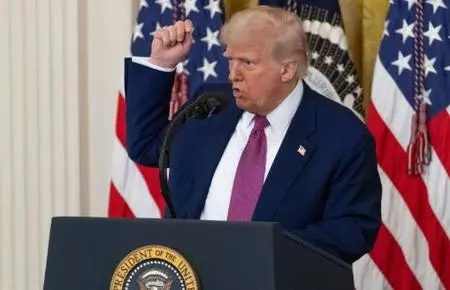
Trump announces Iran-Israel ceasefire after day of diplomacy
text_fieldsIn the aftermath of Iran's missile strike on a U.S. base in Qatar, former President Donald Trump and his top diplomatic and national security team launched an urgent behind-the-scenes effort to negotiate an end to the escalating conflict between Iran and Israel.
According to a senior White House official, Trump was in direct contact with Israeli Prime Minister Benjamin Netanyahu, while Vice President JD Vance, Secretary of State and National Security Adviser Marco Rubio, and Middle East Envoy Steve Witkoff engaged with Iranian officials through a combination of direct and indirect communications.
Qatar played a significant role as a mediator during the talks, with Trump also speaking directly to the Qatari Emir, Tamim bin Hamad bin Khalifa Al Thani, as part of the diplomatic push.
Roughly two days after the United States targeted Iranian nuclear facilities—and just hours after Iran retaliated with its missile attack—Trump announced on his Truth Social account that an agreement had been reached. He described it as a "complete and Total CEASEFIRE" and said it marked the "Official END to THE 12 DAY WAR.”
As of Monday night in the U.S. — early Tuesday morning in the Middle East — it remained uncertain whether the fragile ceasefire would hold.
According to a White House official, Israel had accepted the ceasefire deal on the condition that Iran cease its attacks, and Iran had agreed to those terms.
Sources familiar with the situation said that President Trump informed the Qatari Emir that the U.S. had secured Israel’s agreement to the truce. Trump also expressed appreciation for the Emir’s role in facilitating the negotiations and requested his assistance in encouraging Iran to accept the agreement, the official added, CNN reported.
Vice President JD Vance was reportedly in close coordination with the office of Qatari Prime Minister Sheikh Mohammed bin Abdulrahman bin Jassim Al-Thani to finalize the details.
According to one source and a diplomat with knowledge of the talks, the Iranians agreed to the ceasefire following discussions with Al-Thani. A U.S. official emphasized that multiple conversations with the Qatari Emir were instrumental in securing Iran’s agreement.
In what appeared to be a positive development, Iranian Foreign Minister Abbas Araghchi expressed gratitude toward Iran’s armed forces, stating that military operations against Israel had persisted “until the very last minute,” suggesting that the fighting may have ceased. In a post on X, Araghchi said the Iranian military continued its campaign in response to Israeli aggression up until 4 a.m.
Previously, Araghchi had indicated that Iran would end its military retaliation if Israel halted its strikes by that deadline.
As of yet, Israel has not issued any public confirmation regarding its participation in the ceasefire.
The White House has asserted that the breakthrough in securing the ceasefire was largely due to the U.S. airstrikes on three of Iran’s nuclear sites carried out on Saturday.
Earlier on Monday, Qatari officials notified the United States of incoming Iranian missile strikes targeting a U.S. military base in Qatar, which were successfully intercepted without any reported casualties. According to two sources familiar with the situation, Iran had provided Qatar with advance warning of the retaliatory attack.
Diplomatic sources expressed cautious optimism that Iran’s strikes could serve as a turning point, potentially encouraging Tehran to reengage in negotiations. The recently announced ceasefire is expected to open more space for dialogue between the U.S. and Iran.
Following Israel’s initiation of a military campaign against Iran, U.S. officials, along with intermediaries, launched an intensive diplomatic push to bring Iran back to the negotiating table in hopes of establishing a new nuclear agreement.
Throughout the previous week, the two sides exchanged messages through various channels to revive high-level talks. One regional source confirmed that efforts were also made to arrange a meeting between former President Trump and the Iranian president in Turkey last week, though that meeting ultimately did not take place.
Sources familiar with the ongoing diplomacy say Iran consistently signalled openness to negotiations, but only on the condition that Israel halt its military operations. Even after the U.S. conducted strikes on Iranian nuclear sites, Iranian Foreign Minister Abbas Araghchi reportedly communicated to certain intermediaries that Iran would be willing to return to talks—provided Israel ceased its attacks.
Prior to Saturday’s U.S. strikes on three Iranian nuclear facilities, the Trump administration sent a message to Tehran via intermediaries.
The message had two key points: first, that the U.S. strikes would be limited in scope; and second, that Washington’s terms for a renewed diplomatic agreement were clear and straightforward—namely, that Iran must cease all uranium enrichment, sources said.
Iran, for its part, has consistently asserted its right to enrich uranium. However, during a confidential meeting on Saturday, an intermediary relayed to Iranian officials that the White House remained open to negotiations, with uranium enrichment being the only non-negotiable condition.
This narrowed scope removed several previous sticking points from earlier rounds of nuclear discussions, according to a source familiar with that meeting.


















